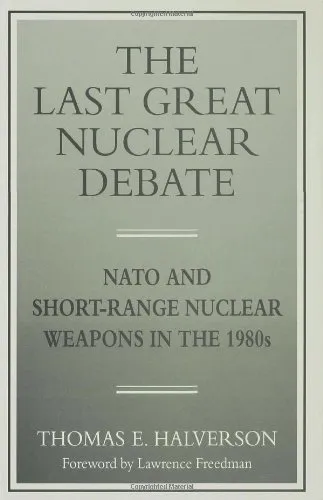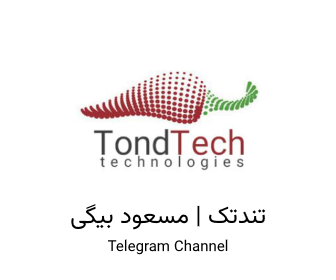The Last Great Nuclear Debate: NATO and Short-Range Nuclear Weapons in the 1980s
3.8
بر اساس نظر کاربران

شما میتونید سوالاتتون در باره کتاب رو از هوش مصنوعیش بعد از ورود بپرسید
هر دانلود یا پرسش از هوش مصنوعی 2 امتیاز لازم دارد، برای بدست آوردن امتیاز رایگان، به صفحه ی راهنمای امتیازات سر بزنید و یک سری کار ارزشمند انجام بدینمعرفی اولیه کتاب "The Last Great Nuclear Debate: NATO and Short-Range Nuclear Weapons in the 1980s"
کتاب "The Last Great Nuclear Debate: NATO and Short-Range Nuclear Weapons in the 1980s" نوشته توماس ای. هالورسن یکی از مهمترین منابع در زمینه مطالعات سیاسی و نظامی مرتبط با جنگ سرد و تحلیل تسلیحات هستهای کوتاهبرد NATO است. این کتاب با نگاهی دقیق و سیستمی به بررسی مباحث کلیدی هستهای دوران دهه 1980 میپردازد و تأثیرات سیاستگذاری نظامی را بر امنیت جهانی تحلیل میکند.
خلاصهای از کتاب
این اثر تمرکز گستردهای روی مباحث کلیدی در سیاست هستهای دهه 1980 دارد که از جمله میتوان به تلاشهای سیاسی و نظامی NATO در توسعه یا محدود کردن تسلیحات هستهای کوتاهبرد اشاره کرد. کتاب از دیدگاه تحلیلی به دو موضوع اصلی میپردازد: اول، وابستگی NATO به تسلیحات هستهای کوتاهبرد به عنوان ابزاری برای بازدارندگی علیه اتحاد جماهیر شوروی؛ دوم، بررسی چالشهای سیاسی داخلی میان اعضای NATO در خصوص استفاده و توسعه این سیستمهای تسلیحاتی.
هالورسن استدلال میکند که این دوره یکی از آخرین "بحثهای بزرگ" درباره بمبهای هستهای بود که تأثیرات عمیقی نه تنها بر سیاستهای غرب بلکه بر نحوه مواجهه جهان با تسلیحات هستهای گذاشت. با بهرهگیری از ترکیب تحلیل تاریخی و سیاسی، کتاب تاریخچهای گسترده از بحرانهای آن دوران ارائه میدهد و چگونگی مواجهه سیاستمداران و فرماندهان نظامی با این چالشها را تشریح میکند.
نکات کلیدی کتاب
- تحلیل ژئوپلیتیک جنگ سرد و نقش NATO در مقابله با اتحاد جماهیر شوروی.
- بررسی دقیق تسلیحات Short-Range Nuclear Weapons و کاربردهای تاکتیکی آنها.
- چالشهای اخلاقی و استراتژیک استفاده از تسلیحات هستهای برای اهداف بازدارندگی.
- نمایش اختلافات سیاسی میان اعضای NATO در تنظیم استراتژیهای نظامی.
- ارتباط مباحث نظامی دهه 1980 با سیاستهای فعلی امنیت جهانی.
نقلقولهای مشهور از کتاب
"The limits of reliance on nuclear weapons were never simply technical; they were deeply political, shaped by the complex interplay of domestic and international pressures."
"NATO’s reliance on Short-Range Nuclear Weapons symbolized both technological innovation and strategic vulnerability."
چرا این کتاب مهم است؟
کتاب "The Last Great Nuclear Debate" نه تنها تاریخچهای جذاب و تحلیلی از یکی از چالشبرانگیزترین دورههای جنگ سرد ارائه میدهد، بلکه اهمیت تصمیمگیریهای استراتژیک را در سیستمهای ائتلافی مانند NATO برجسته میکند. این اثر برای دانشجویان علوم سیاسی، تحلیلگران نظامی، و هر شخص علاقهمند به سیاستهای تسلیحاتی و بازدارندگی ارزشمند است. با نگاهی عمیق به چالشهای اخلاقی و عملی استفاده از تسلیحات هستهای، این کتاب نقطه شروعی برای فهم بهتر پیچیدگیهای سیاستگذاری جهانی ارائه میدهد.
Introduction
"The Last Great Nuclear Debate: NATO and Short-Range Nuclear Weapons in the 1980s" delves into one of the most critical and tumultuous periods of Cold War politics. Written by Thomas E. Halverson, this book thoroughly explores the strategic, political, and ideological clash surrounding NATO's short-range nuclear weapons at a time when world security hung in the balance. The 1980s were a turning point when the debate over these weapons dominated the conversation among policymakers, military strategists, and peace activists. This meticulously researched book sheds light on the decisions that shaped NATO's nuclear policy, the broader implications of those decisions, and the enduring lessons for modern global security.
As the Cold War drew closer to an end, NATO's management of short-range nuclear arsenals presented unprecedented challenges. Halverson examines this dynamic with clarity, rigor, and accessibility, making the book a key resource for historians, policymakers, and anyone interested in international security studies. Divided into thematic explorations of policy, strategy, and ideology, this book doesn't just recount history; it invites readers to critically analyze the enduring dilemmas underlying nuclear deterrence and alliance unity.
A Detailed Summary of the Book
"The Last Great Nuclear Debate" captures the critical discussions and decisions surrounding NATO’s short-range nuclear weapons policy in the final decade of the Cold War. These debates were not only about military strategy but also reflected broader tensions—both within NATO itself and in relations with adversaries such as the Soviet Union. The book begins by providing historical context, offering an overview of NATO’s nuclear posture in the 1970s and early 1980s. The reader is introduced to the divergent views among NATO members and the growing influence of the peace movements in Europe and the United States.
A significant focus of the book is on the pivotal INF (Intermediate-Range Nuclear Forces) Treaty negotiations between the U.S. and the Soviet Union. While much attention has historically been paid to eliminating intermediate-range weapons, Halverson directs the spotlight onto the often-overlooked short-range systems. The internal discord within NATO over these weapons, coupled with mounting public opposition, made them a highly contentious issue. Each chapter peels back layers of the debate, providing insights into diplomatic negotiations, arms control perspectives, and the military strategies that shaped decisions.
In the latter portion of the book, Halverson examines the decline of short-range nuclear systems and the eventual rethinking of NATO’s arsenal. Despite the contentious debates, the book argues that this tumultuous period ultimately strengthened NATO's political cohesion and paved the way for more flexible post-Cold War security strategies.
Key Takeaways
- The importance of alliance cohesion: The book underscores how maintaining unity among NATO members was as critical as addressing the nuclear threat itself.
- Arms control as a multifaceted struggle: Halverson reveals the complexity of arms control negotiations, involving not only military strategies but also ideological, political, and public pressures.
- Lessons for modern nuclear policy: The debates of the 1980s hold valuable insights for contemporary discussions about deterrence, arms control, and alliance dynamics.
- Public opinion matters: The role of peace movements and anti-nuclear demonstrations significantly influenced NATO's policy direction.
Famous Quotes from the Book
"NATO’s survival as a political and military alliance depended less on the policies it adopted and more on its ability to reconcile differing national priorities into a shared vision of security."
"In the shadow of nuclear weapons, diplomacy becomes not just an art but a vital necessity."
Why This Book Matters
"The Last Great Nuclear Debate" is more than just a historical analysis; it is an exploration of the complexities that define strategic decision-making in an alliance as diverse and influential as NATO. The book is particularly relevant today as the world faces new challenges surrounding nuclear arms control, shifting alliance dynamics, and the resurgence of great power rivalries.
By revisiting the intense debates of the 1980s, Halverson provides readers with valuable lessons about maintaining unity in the face of security threats, balancing public opinion with strategic imperatives, and the ongoing relevance of arms control in a changing geopolitical landscape. For scholars, policymakers, and global citizens, this book offers critical insights into an era that shaped the modern security environment.
دانلود رایگان مستقیم
برای دانلود رایگان این کتاب و هزاران کتاب دیگه همین حالا عضو بشین


